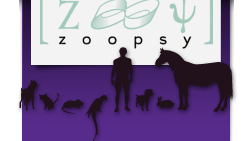| |
Double-blind, placebo-controlled trial of venlafaxine to treat behavioural disorders in cats: a pilot study
Delphine Metz, Tiphaine Medam, Sylvia Masson
Revue : Journal of Feline Medicine and Surgery
Objectives
Venlafaxine, a specific inhibitor of both noradrenaline and serotonin, is commonly used in human medicine to treat depression, anxiety and social phobia. Its formulation in small granules renders it interesting to test on cats, which are usually reluctant to take medication. Venlafaxine was administered at 1 mg/kg for 60 days, using a double-blind, placebo-controlled protocol, to cats aged ⩾6 months exhibiting aggressiveness, fear or house-soiling.
Methods
After one cat’s withdrawal, 21 cats were included in the study: 11 in the venlafaxine group and 10 in the placebo group. Three consultations were conducted, on day 0, day 30 and day 60. Each visit consisted of (1) veterinarian- and owner-based scoring of the cat’s behavioural improvement; (2) scoring of the cat’s compliance with removal from its carrier and compliance with manipulation; and (3) owner scoring of the ease of administration and recording of the potential adverse effects of the treatment.
Results
Improvement was significantly higher in the venlafaxine group; as early as day 30, according to the veterinarian scoring, and at day 60, according to both the veterinarian and owner scoring. In contrast, neither the removal nor the manipulation scores were significantly different between the two treatment groups. Venlafaxine seemed to improve all three studied signs, as early as day 30 for fear and aggressiveness, and at day 60 for house-soiling. The adverse effects of venlafaxine were limited to drowsiness in one cat. All cats tolerated the treatment well during the 60-day period.
Conclusions and relevance
These results suggest that venlafaxine is efficient in treating several behavioural problems and is easy to administer. More studies should be conducted to explore its effects at different dosages on specific diagnoses.
Keywords
Venlafaxine, veterinary visit, fear, aggression, urine marking, behavioural problem

Journal of Feline Medicine and Surgery (2021) 1-11
Lien
|
|



